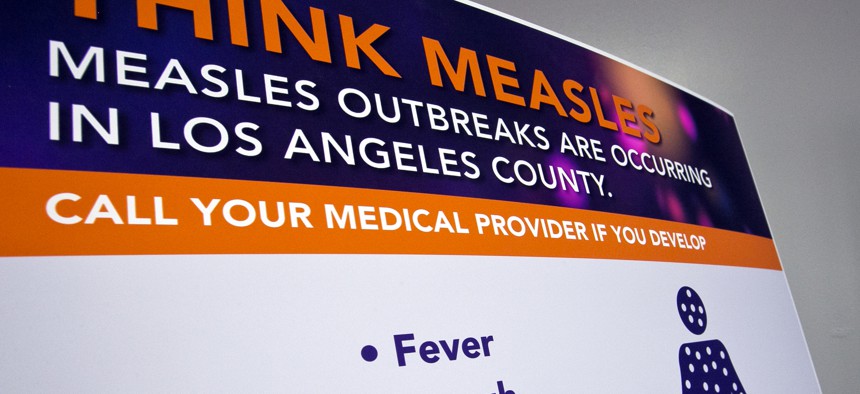Measles Outbreak Hits 25-Year High

Hundreds of college students were quarantined in California after a measles outbreak was declared in Los Angeles. AP
Officials confirmed 78 new cases of the measles, making the current outbreak the largest in more than two decades.
Federal officials confirmed 78 new cases of the measles last week, bringing the nationwide total to 704 amid the largest outbreak of the disease since 1994. And it’s likely not done spreading.
“We expect to see additional cases,” Dr. Nancy Messonier, director of the Centers for Disease Control and Prevention’s National Center for Immunization and Respiratory Diseases, told reporters on a phone call Monday. Containing the outbreak, she said, will take “everybody working together to identify people at risk who are unvaccinated and getting them vaccinated. We’d like to get ahead of this thing.”
The increase is primarily contained to California and New York, particularly in New York City, which accounts for more than half of the cases nationwide. As of Friday, 390 measles cases were confirmed in the city, largely in Orthodox Jewish communities that were targeted with anti-vaccine propaganda.
Those pamphlets—touting the debunked link between vaccine and autism-spectrum disorders and citing rabbis as sources—are aimed at swaying Orthodox Jewish people. It’s unclear why those enclaves were targeted, Mossenier said, but it’s proved an effective tactic.
“I can’t explain why. I think you’d have to talk to the people spreading that misinformation,” she said. “But we definitely see it targeted, and these vulnerable communities are the communities in which we’re seeing these outbreaks right now.”
In California, hundreds of students over the weekend were placed under quarantine at two universities after an outbreak was declared in Los Angeles, although most had been cleared to go back to classes by Monday. The state already has one of the nation's strictest vaccination laws, requiring immunizations for children who attend public school with exemptions allowed only if a doctor says there's a medical reason that warrants them. Legislators there are still attempting to tighten the rule.
The nationwide outbreak is the largest in decades, since before measles was declared eliminated in the United States in 2000. The rash of cases is primarily due to two large outbreaks, in New York and Washington state, Messonier said.
Clark County Public Health in Washington last week declared its outbreak over, but “the outbreaks in New York City and New York state are the largest and longest-lasting since the disease was eliminated,” Messonier said. “The longer those outbreaks continue, the greater the chance that measles will once again gain a foothold in the United States.”
Measles have also been confirmed in Arizona, Colorado, Connecticut, Florida, Georgia, Illinois, Indiana, Iowa, Kentucky, Maryland, Massachusetts, Michigan, Missouri, Nevada, New Hampshire, New Jersey, Oregon, Texas and Tennessee.
Despite the debunked theory that vaccines can cause autism and other disorders, 17 states allow parents to exempt their children from vaccines due to philosophical or personal reasons. Most states also allow religious exemptions. Legislators in some states are reconsidering those provisions amid the ongoing outbreak, though none have been signed into law. State legislators in Washington passed a bill eliminating the personal and philosophical exemption specifically for the measles vaccine; the legislation now awaits Gov. Jay Inslee's signature.
The vast majority of cases are in unvaccinated children, who are most vulnerable to infection and also most likely to suffer complications, including pneumonia and encephalitis.
“There are no treatments and no cures for measles, and there’s no way to predict how bad a case of measles will be,” said Dr. Robert Redfield, the CDC’s director. “Some children may have very mild symptoms, but others may face serious complications.”
Nine percent of measles patients this year have been hospitalized, and 3 percent have had pneumonia. No deaths have been reported, Redfield said.
The call with federal officials Monday came at the beginning of National Infant Immunization Week, when health officials typically urge parents to protect their babies with vaccinations. That push is particularly important given the outbreak, said Alex Azar, Secretary of Health and Human Services.
“Everyone should be protected against measles and other vaccine-preventable diseases,” he said. “Measles is not a harmless childhood illness but a dangerous, contagious disease. The suffering we are seeing today is completely avoidable.”
PREVIOUSLY on Route Fifty:
Kate Elizabeth Queram is a Staff Correspondent for Route Fifty and is based in Washington, D.C.
NEXT STORY: This City Might Give Homeless People the Right to Camp Anywhere





